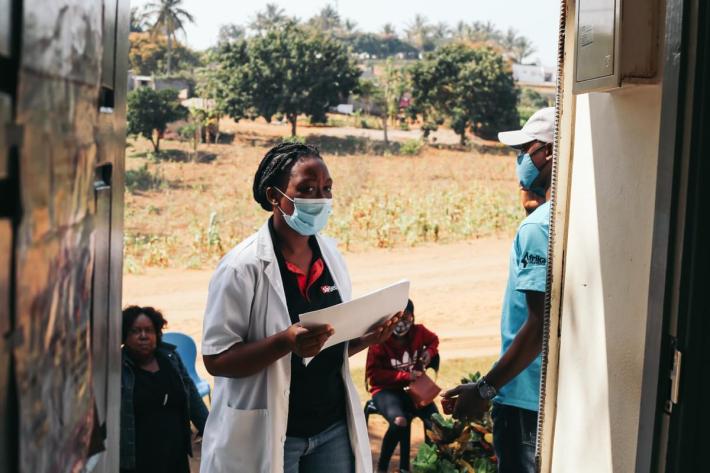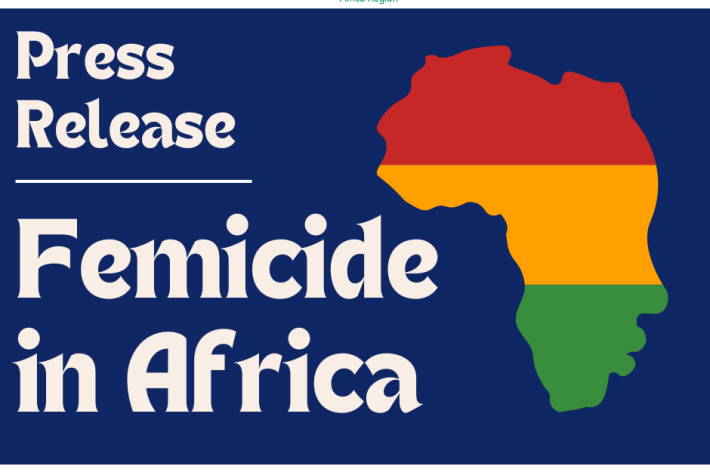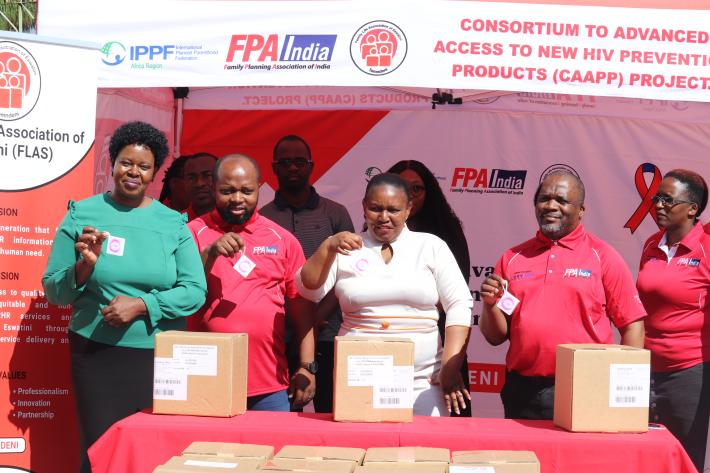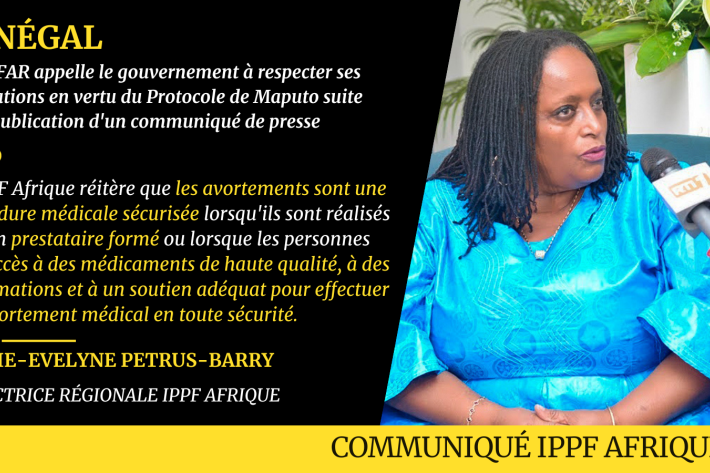Latest press releases
A selection of stories from across the Federation
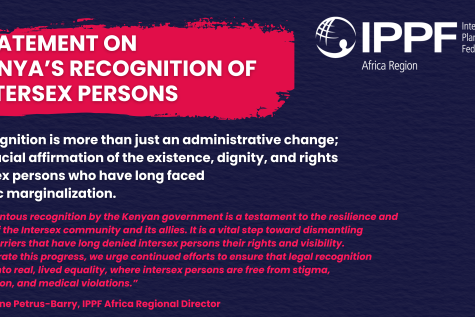
Kenya
IPPF Africa Region Welcomes Kenya’s Landmark Recognition of Intersex Persons
IPPF Africa Region Welcomes Kenya’s Landmark Recognition of Intersex Persons Nairobi, Kenya: 13 February 2025 – On 31 January 2025, Kenya has taken a groundbreaking step towards inclusivity and human rights by officially recognizing intersex as a sex marker alongside male and female in the Kenya Legal Notice 153 of 2025.


| 13 February 2025
IPPF Africa Region Welcomes Kenya’s Landmark Recognition of Intersex Persons
IPPF Africa Region Welcomes Kenya’s Landmark Recognition of Intersex Persons Nairobi, Kenya: 13 February 2025 – On 31 January 2025, Kenya has taken a groundbreaking step towards inclusivity and human rights by officially recognizing intersex as a sex marker alongside male and female in the Kenya Legal Notice 153 of 2025. This marks a significant policy shift that affirms the dignity and rights of intersex persons from birth. The International Planned Parenthood Federation Africa Region (IPPFAR) welcomes this milestone, which reflects the tireless efforts of intersex persons, activists, and allies who have long advocated for legal recognition. By including intersex in official documentation, Kenya is addressing years of systemic marginalization and laying the foundation for greater visibility and protection. This recognition is more than just an administrative change; it is a crucial affirmation of the existence, dignity, and rights of intersex persons who have long faced systemic marginalization. Societal stigma has forced many to conceal their identities, leading to a lack of public awareness, inadequate medical support, and legal invisibility. The extent of this invisibility is reflected in official data—while the 2019 census recorded only 1,524 individuals as intersex, the Kenya National Commission on Human Rights estimates the actual population could be as high as 1.4 million. The significance of this recognition is deeply felt within the Intersex community. Andy Maxwell, an intersex activist and Executive Director of Q We Rise Network expressed the overwhelming joy and validation this brings: “Finally, we can have our identity reflected on our identification documents. We are also incredibly excited about this victory, especially at a time when it felt like our efforts were being challenged.” Marie-Evelyne Petrus-Barry, IPPF Africa Regional Director, said: "This momentous recognition by the Kenyan government is a testament to the resilience and advocacy of the Intersex community and its allies. It is a vital step toward dismantling systemic barriers that have long denied intersex persons their rights and visibility. As we celebrate this progress, we urge continued efforts to ensure that legal recognition translates into real, lived equality, where intersex persons are free from stigma, discrimination, and medical violations". While legal recognition is a milestone, intersex individuals continue to face violations of bodily autonomy through forced medical interventions. Non-consensual procedures, often performed in infancy or childhood to fit binary norms, cause lasting physical and psychological harm. True inclusion requires not only recognition but also strong protections against these harmful practices, ensuring intersex persons have full control over their own bodies. “RHNK applauds the Kenyan government for this historic step in recognizing the rights and dignity of intersex persons. As an organization committed to advancing inclusive sexual and reproductive health rights and strengthening healthcare access, we emphasize the need to ensure that this recognition also leads to equitable, stigma-free and gender affirming healthcare services. Every intersex person deserves the right to bodily autonomy and access to non-discriminatory medical care”, said Nelly Munyasia, Executive Director, Reproductive Health Network Kenya, IPPFAR’s Associate Member in country. IPPFAR is committed to advancing intersex rights by working with communities, policymakers, and healthcare providers through Reproductive Health Network Kenya. While legal recognition is progress, ensuring meaningful protections and rights-based healthcare remains essential on the path to full equality. END For further information or to request an interview, please contact: -Mahmoud GARGA, Lead Strategic Communication, Voice and Media, IPPF Africa Regional Office (IPPFAR) – email: [email protected] / Tel: +254 704 626 920 ABOUT IPPF AFRICA REGION (IPPFAR) The International Planned Parenthood Federation Africa Region (IPPFAR) is one of the leading sexual and reproductive health (SRH) service delivery organization in Africa, and a leading sexual and reproductive health and rights (SRHR) advocacy voice in the region. Headquartered in Nairobi, Kenya, the overarching goal of IPPFAR is to increase access to SRHR services to the most vulnerable youth, men and women in sub-Saharan Africa. Supported by thousands of volunteers, IPPFAR tackles the continent’s growing SRHR challenges through a network of Member Associations (MAs) in 40 countries. We do this by developing our MAs into efficient entities with the capacity to deliver and sustain high quality, youth focused and gender sensitive services. We work with Governments, the African Union, Regional Economic Commissions, the Pan-African Parliament, United Nations bodies among others to expand political and financial commitments to sexual and reproductive health and rights in Africa. Learn more about us on our website. Follow us on Facebook, Instagram and YouTube.

| 05 February 2025
The DRC: IPPFAR Calls for Immediate De-Escalation of Conflict, Establishment of Humanitarian Corridor, and Protection of Women and Girls
Nairobi, Kenya: 5 February 2025 – The International Planned Parenthood Federation Africa Region (IPPFAR) calls for an immediate de-escalation of the conflict in the eastern region of the Democratic Republic of the Congo (DRC) and the immediate establishment of humanitarian corridors to ensure unimpeded access to lifesaving aid, including sexual and reproductive health and rights (SRHR) services. The situation in eastern DRC has deteriorated catastrophically following the capture of Goma by M23 armed groups between 26 and 29 January 2025. IPPF has received distressing reports of widespread suffering, with thousands of civilians trapped and deprived of essential humanitarian assistance, including access to sexual and reproductive healthcare. At least 900 people have been killed, nearly 3,000 injured, and countless others displaced, forced to seek refuge in overcrowded churches, schools, and temporary shelters, where their safety remains precarious. IPPF’s partners in the DRC report the destruction of aid and healthcare facilities, looting by armed groups, and the evacuation of United Nations and humanitarian INGO staff, leaving civilians at heightened risk of sexual violence, unintended pregnancies, sexually transmitted infections (STIs), and food insecurity. “We are witnessing a humanitarian catastrophe, with hospitals inaccessible and humanitarian access blocked, pregnant women and survivors of sexual violence have nowhere to turn. Maternal services, emergency contraception, post-rape care, and safe abortion services are entirely out of reach, leaving thousands of women and girls facing forced pregnancies, sexually transmitted infections, and lifelong trauma” said Marie-Evelyne Petrus-Barry, IPPF Africa Regional Director. IPPF’s in-country partners are not able to fully resume all Sexual and Reproductive Health in Emergencies (SRHiE) services, referrals, and psychosocial support due to safety concerns for their healthcare workers and shortage of commodities. The organization is calling for the urgent establishment of a protected humanitarian corridor to ensure the delivery of lifesaving care, particularly for those subjected to sexual violence. "Conflict shatters lives and denying access to sexual reproductive health and rights only exacerbates the suffering, deepens inequalities, and robs people—especially women and girls—of their dignity and future. These are fundamental human rights, and are as critical as food, water, and shelter in times of crisis", added Marie-Evelyne Petrus-Barry, IPPF Africa Regional Director. “Goma is harbouring over 400.000 Internally displaced people that have scattered due to the clashes between the DRC army and M23. Women and children remaining have once again been victims of violence and could face sexual violence historically used as a weapon of war against civilian. The international community must prioritise women and children's needs and take decisive actions to prevent atrocities to unfold. We must ensure that the most vulnerable are at the heart of our response, and, most importantly, we must work to prevent sexual violence from happening in the first place", said Valerie Dourdin, IPPF Global Humanitarian Director. IPPF urges regional leaders, the international community, and UN agencies to take immediate action to: End the violence, with all parties ceasing their offensive and an immediate end to the targeting of civilians, in line with international humanitarian law. Guarantee humanitarian access and safe, unhindered delivery of essential aid, including emergency SRH services, post-rape care, and safe abortion access. Protect women and girls with a zero-tolerance approach to sexual violence, with justice and accountability for perpetrators. Ensure safe refuge and immediate protection for displaced persons, with neighbouring countries urged to accept and support refugees. Restore healthcare services and the immediate re-establishment of essential healthcare and SRH services to support affected communities. Protect healthcare workers and facilities by implementing measures to ensure their safety and put an end to attacks on frontline responders. IPPF remains committed to advocating for the rights and dignity of those affected by the ongoing conflict and will continue working with its Member Associations to restore access to life-saving humanitarian SRH services in the Eastern DRC and neighbouring countries. END For further information or to request an interview, please contact: -Mahmoud GARGA, Lead Strategic Communication, Voice and Media, IPPF Africa Regional Office (IPPFAR) – email: [email protected] / Tel: +254 704 626 920 - Hanna Lund Adcock Senior Humanitarian Communication Adviser, IPPF Global Humanitarian Team – email: [email protected] / Tel: +44 773 792 49 15 ABOUT IPPF AFRICA REGION (IPPFAR) The International Planned Parenthood Federation Africa Region (IPPFAR) is one of the leading sexual and reproductive health (SRH) service delivery organization - in normal and humanitarian situations- in Africa, and a leading sexual and reproductive health and rights (SRHR) advocacy voice in the region. Headquartered in Nairobi, Kenya, the overarching goal of IPPFAR is to increase access to SRHR and SRHiE services to the most vulnerable youth, men and women in sub-Saharan Africa. Supported by thousands of volunteers, IPPFAR tackles the continent’s growing SRHR and SRHiE challenges through a network of Member Associations (MAs) in 40 countries. We do this by developing our MAs into efficient entities with the capacity to deliver and sustain high quality, youth focused and gender sensitive services. We work with Governments, the African Union, Regional Economic Commissions, the Pan-African Parliament, United Nations bodies among others to expand political and financial commitments to sexual and reproductive health and rights in Africa. Learn more about us on our website. Follow us on Facebook, Instagram and YouTube.

| 24 September 2024
Major New Health Programme to Expand Sexual and Reproductive Health Services in East and Southern Africa
Nairobi, 23 September 2024 – A groundbreaking £75.125 million project has been announced by the International Planned Parenthood Federation (IPPF) and its partners, the International Rescue Committee (IRC), Options, Ipas, and Johns Hopkins University Centre for Communication Programmes, to transform sexual and reproductive health services across East and Southern Africa. This large-scale initiative will benefit seven countries, supporting millions of women, girls, and vulnerable communities in Burundi, Ethiopia, Madagascar, Somalia, South Sudan, Sudan, and Zambia. This programme, known as Women’s Integrated Sexual Health 2 (WISH 2) Lot 2, is funded by the UK Foreign, Commonwealth and Development Office (FCDO). As part of FCDO WISH Dividend, it builds on the successes of FCDO’s £272 million Women’s Integrated Sexual Health (2018-2024) programme, which spanned 27 countries across Africa and Asia. Over its lifespan, the first WISH programme supported over an estimated 16.9 million women and girls, helping them gain access to critical SRHR services. FCDO’s continued partnership with IPPF for this next phase of WISH was unveiled by FCDO's Chris Carter, on behalf of the UK Minister for Africa, Lord Collins, during the United Nations General Assembly (UNGA) side event, “SRHR: Securing reproductive choice for the next generation.” Announcing FCDO’s partnerships with IPPF, MSI Reproductive Choices and the Children's Investment Fund Foundation, Chris Carter noted the new programme will play a critical role in increasing women's voice, choice and control across 13 countries in Africa.” With the goal of delivering over seven million ‘couple years protection,’ the programme will address critical healthcare gaps, promote reproductive choice, and tackle harmful social norms. It will also provide urgent support to improve policies, strengthen health systems, and safeguard the reproductive rights of women and girls, especially in areas affected by conflict and displacement. At the heart of this initiative is a focus on reaching the most marginalised groups, including young women and girls under 20, those living in poverty, people with disabilities, and communities in conflict zones. Importantly, WISH2 will also work to improve access to safe abortion care and counteract the growing threats to women’s and girls' sexual and reproductive health rights. IPPF Director General Dr Alvaro Bermejo emphasised the critical need to protect and expand access to SRHR. “WISH2 will continue our mission of empowering women and girls across Africa to unlock their full potential. We will not only tackle the rollback of SRHR rights but also strengthen disability inclusion while delivering sustainable healthcare solutions,” said Dr Bermejo. “We’re grateful to the UK Government for their unwavering support in this important work.” Elshafie Mohamed Ali, Executive Director of Sudan Family Planning Association (SFPA) said “WISH2 is essential given Sudan’s current circumstances, particularly the ongoing conflict since April 15, 2023. The programme addresses the growing need for sexual and reproductive health services, offering crucial support to vulnerable communities amidst increasing instability and humanitarian challenges.” Chris Carter, Deputy Director, Head of Human Development Department, highlighted the impact of this new initiative: “Access to sexual and reproductive health services saves lives, empowers women and girls, and supports education, transforming lives and entire livelihoods. This project will amplify women’s voice, choice, and control across Africa, and we are proud to partner with IPPF and African organizations in this critical mission.” For media enquiries, please contact [email protected]

| 11 September 2024
IPPF Africa Region Calls for Urgent Action Against Rising Femicide in Africa
IPPF Africa Region Calls for Urgent Action Against Rising Femicide in Africa Nairobi, 11 September 2024 – The International Planned Parenthood Federation Africa Region (IPPFAR) notes with grave concern the alarming rise of femicide across Africa, underscored by the recent murder of Ugandan Olympic athlete Rebecca Cheptegei by her former partner. This tragic killing is a stark reminder of the growing epidemic of violence against women on the continent and globally. Femicide—the gender-based killing of women—is rooted in systemic misogyny and patriarchy. According to UN Women, 89,000 women and girls were murdered globally in 2022, the highest figure recorded in 20 years, however it is likely that these figures are significantly underreported. Furthermore, the African continent has the highest rate of femicide globally. More than half of these women were killed by intimate partners or family members, and this violence continues to thrive under a global culture of impunity. “Violence against women and girls is among the least prosecuted and punished crimes in the world,” noted the UN Assembly (Resolution no. 70/176). This impunity must stop, and governments must take immediate steps to address the issue. Marie-Evelyne Petrus-Barry, IPPF Africa Regional Director, states, “Femicide is not just a women's issue—it is a human rights issue. Governments must invest in women-led strategies that have proven to prevent violence against women and girls and hold perpetrators accountable. The lack of standardized data and consistent reporting across regions only perpetuates this crisis. Additionally, marginalized women, such as LGBTIQ+ individuals, women with disabilities, female sex workers, and women living in precarious situations such as refugees and internally displaced women, face a heightened risk of femicide. The lives of women and girls are at stake, and the time for action is now”. Patriarchy fuels femicide, and when combined with systematic issues such as capitalism, poverty, unemployment, and a lack of support systems geared toward girls and women, results in the marginalization and ongoing violence against women, girls, and gender-diverse individuals. IPPFAR, through the Feminist Opportunities Now (FON) Project—funded by the French Development Agency and French Ministry of European and Foreign Affairs—provides financial and technical assistance to feminist civil society organizations working to end gender-based violence and achieve gender equality. Collaborating with women’s rights organizations like Feminists in Kenya, The Wangu Kanja Foundation, Smart Ladies Youth Initiative, FON and IPPFAR are committed to dismantling discriminatory gender norms, engaging men and boys in the fight against patriarchy, and advocating for systemic change. Tatiana Gicheru from Feminists in Kenya, an organisation supported by the FON Project, shares her frustration: “Feminists in Kenya recognizes femicide as a violent manifestation of patriarchal power, and we remain dedicated to dismantling structures that enable all forms of violence against women in all their diversities. We urge the Kenyan Government to act decisively on our demands shared during the 2019 and 2024 nationwide anti-femicide marches. Enough is enough!” IPPF Africa and its partners urge Governments across Africa and the world to act decisively to end femicide. END For further information or to request an interview, please contact: -Mahmoud GARGA, Lead Strategic Communication, Voice and Media, IPPF Africa Regional Office (IPPFAR) – email: [email protected] / Tel: +254 704 626 920 ABOUT IPPF AFRICA REGION (IPPFAR) The International Planned Parenthood Federation Africa Region (IPPFAR) is one of the leading sexual and reproductive health (SRH) service delivery organization in Africa, and a leading sexual and reproductive health and rights (SRHR) advocacy voice in the region. Headquartered in Nairobi, Kenya, the overarching goal of IPPFAR is to increase access to SRHR services to the most vulnerable youth, men and women in sub-Saharan Africa. Supported by thousands of volunteers, IPPFAR tackles the continent’s growing SRHR challenges through a network of Member Associations (MAs) in 40 countries. We do this by developing our MAs into efficient entities with the capacity to deliver and sustain high quality, youth focused and gender sensitive services. We work with Governments, the African Union, Regional Economic Commissions, the Pan-African Parliament, United Nations bodies among others to expand political and financial commitments to sexual and reproductive health and rights in Africa. Learn more about us on our website. Follow us on Facebook, Twitter, Instagram and YouTube. ABOUT FEMINISTS IN KENYA Feminists in Kenya is a social movement of Feminist and Queer activists committed to achieving gender justice. As organizers of the #TotalShutdownKe march against femicide, they are focused on mobilizing and organizing with women across Kenya to challenge systemic and interpersonal oppression. Founded on Community, Joy and Resistance, their vision is a world where women, in all their diversities, can live free from systemic violence in both public and private spaces. ABOUT THE FEMINIST OPPORTUNITIES NOW (FON) PROJECT The objective of the project Feminist Opportunities Now (FON), is to build the capacity of women's movements, via sub-grants to feminist organisations, with a particular effort to reaching small, even non-registered organisations to address and respond to gender-based violence. The programme is developed based on an ecological model, using multi-disciplinary gender-transformative approaches. In addition to direct and flexible sub-granting (for € 7 million), FON also provides a unique opportunity for longer-term mentorship to support feminist organisations in their overall development, with trainings specifically tailored to their needs. FON also supports feminist organisations to identify other/diverse sources of funding and includes a research-action component to understand how these approaches can be scaled-up and made sustainable. Website: Feminist Opportunities Now

| 27 August 2024
Eswatini to roll out first women-controlled HIV prevention product
Eswatini (27 August 2024) - IPPF’s Member Association in Eswatini, the Family Life Association of Eswatini (FLAS), is soon to roll out the first women-controlled HIV prevention product, the dapivirine vaginal ring (DVR). FLAS will be among the first organisations to offer the DVR outside implementation or pilot studies anywhere in the world. Made of flexible silicone, the ring is inserted into the vagina by a woman and slowly releases the antiretroviral drug dapivirine in the vagina over a one-month period, helping to reduce a woman’s risk of acquiring HIV. In 2023, in sub-Saharan Africa, women and girls accounted for 62% of all new HIV infections and every week, 3,100 adolescent girls and young women aged 15–24 years became infected with HIV. Therefore, there continues to be an urgent need for HIV prevention methods that females can use to protect themselves. The DVR is a product women can control themselves and use without the knowledge or consent of their partners, unlike condoms, which men often refuse to use. The DVR is inserted into the vagina and left for a one-month period, where it can then be replaced each month for continued protection. Unlike daily oral PrEP, the DVR does not rely on remembering to take a pill each day and is also discreet as it stays inside the vagina throughout the month. The DVR does not prevent pregnancy or other sexually transmitted infections (STIs), so women choosing to use the ring may want to consider combining it with condoms and methods of contraception. The availability of the DVR is an exciting step in supporting women’s autonomy and choice in HIV prevention. This need for women-controlled HIV prevention products has long been advocated for, with the African Women Prevention Community Accountability Board launching the HIV Prevention Choice Manifesto in early 2023. The Choice Manifesto prioritises the principle of choice to ensure that women and girls have the right to choose which HIV prevention methods work for them. Currently the ring is available at selected facilities through implementation studies across six countries in East and Southern Africa; South Africa, Kenya, Zimbabwe, Lesotho, Eswatini, and Uganda. Diantha Pillay, Associate Director for Product Access for IPM South Africa NPC (an affiliate of the Population Council), said: “It is encouraging to see the efforts made by FLAS and IPPF to support the choice agenda for HIV prevention for women and make effective HIV prevention methods, like the DVR, more widely accessible in a real-world setting. We hope this can pave the way for introduction of future pipeline products that speak to the needs of women.” The Population Council is currently developing a longer duration DVR that women would use for three months versus one month to significantly lower annual product costs and offer women a more convenient option to protect themselves. Thabo Lizwe Masuku, Programs Manager for FLAS, said: “Women have been telling us for a long time that there is a need for a variety of methods for HIV prevention, since they are highly exposed. For women and girls to truly have choice about what works for them as they navigate different stages and circumstances of their lives, policy makers, donors, governments and implementers must ensure the mix of HIV prevention methods are available, accessible, and affordable. Access to the ring through our clinics in Eswatini now gives women choice and options to protect themselves against HIV.” IPPF is committed to ensuring that choice in HIV prevention is a reality for women and girls and aims to roll out the dapivirine vaginal rings at as many Member Associations as possible, as well as offer other HIV-prevention choices, as we work alongside our partners towards a future free of HIV in Africa and beyond. For more information and to speak to staff in Eswatini, please email [email protected] Notes: The dapivirine vaginal ring has been recommended by the WHO since January 2021. (25) In clinical trials, the ring was shown to reduce HIV infection by 35% in The Ring Study (26,27) and 27% in the ASPIRE Study. (28,29) Recent open-label studies show greater adherence to the ring, and modelling data suggest that HIV risk could be reduced by about 50%. (30) The dapivirine ring has received regulatory approval from the European Medicines Agency (EMA), as well as from local medicines regulators in Namibia, South Africa, Kenya, Zimbabwe, Uganda, Zambia, Malawi, Rwanda, Eswatini, Lesotho, Botswana and is currently under regulatory review in a number of other countries Our Member Associations (MAs) that provide clinical services are required to provide comprehensive SRH services through our Integrated Package of Essential Services (IPES) which include services for sexual health and well-being, contraception, abortion care, sexually transmitted infections (STIs)/reproductive tract infections (RTIs), HIV, obstetrics and gynaecology, fertility support, and sexual and gender-based violence. IPPF’s new five-year strategy, Come Together, focuses on expanding choice. In support of this, we recently launched a special programme to expand our HIV prevention options, which aims to integrate the newest HIV prevention methods – the vaginal ring and injectable PrEP - into our comprehensive sexual and reproductive health services. IPPF’s IMAP Statement on Biomedical HIV Prevention can be found here. About the Family Life Association of Eswatini (FLAS) For over 30 years, the Family Life Association of Eswatini (FLAS) has provided sexual and reproductive health (SRH) services to the people of Eswatini (formally Swaziland). While family planning, antenatal, post-natal and post-abortion care form a key part of FLAS services, there’s a significant focus on HIV and AIDS programmes. Eswatini has some of the highest HIV and AIDS prevalence rates in the world. As a result, the prevention and management of HIV and AIDS, the provision of voluntary counselling and testing (VCT), and the prevention of mother to child transmission (PMTCT) are central to FLAS’s work. FLAS has 15 service points, including three permanent clinics and three mobile facilities, staffed by a permanent team of 40 staff backed by 230 volunteers, 180 Youth Action Movement members and 29 peer educators. About the International Planned Parenthood Federation (IPPF) IPPF is a global healthcare provider and a leading advocate of sexual and reproductive health and rights (SRHR) for all. Led by a courageous and determined group of women, IPPF was founded in 1952 at the Third International Planned Parenthood Conference. Today, we are a movement of 150 Member Associations and Collaborative Partners with a presence in over 146 countries. Our work is wide-ranging, including comprehensive sex education, provision of contraceptives, safe abortion, and maternal care and responding to humanitarian crises. We pride ourselves on being local through our members and global through our network. At the heart of our mission is the provision of – and advocacy in support of – integrated healthcare to anyone who needs it regardless of race, gender, sex, income, and crucially no matter how remote. Our services are available to all, and reach the most marginalised groups in societies, including key and priority populations, youth, and people with disabilities. Most of our MAs have special programs to engage youth (10-24) inside and outside of school settings. Because our clinics offer comprehensive services, attending our clinics is non-stigmatizing and does not label people as having a particular disease or membership to a particular group. This model of services that are integrated and open to all, embedded in indigenous, locally owned organisations, is ideal for ensuring that the most vulnerable and marginalised groups can access the HIV prevention services they need. About the Population Council The Population Council is a leading research organization dedicated to building an equitable and sustainable world that enhances the health and well-being of current and future generations. The Council transforms global thinking on critical health and development issues through social science, public health, and biomedical research. We generate ideas, produce evidence, and design solutions to improve the lives of underserved populations around the world.
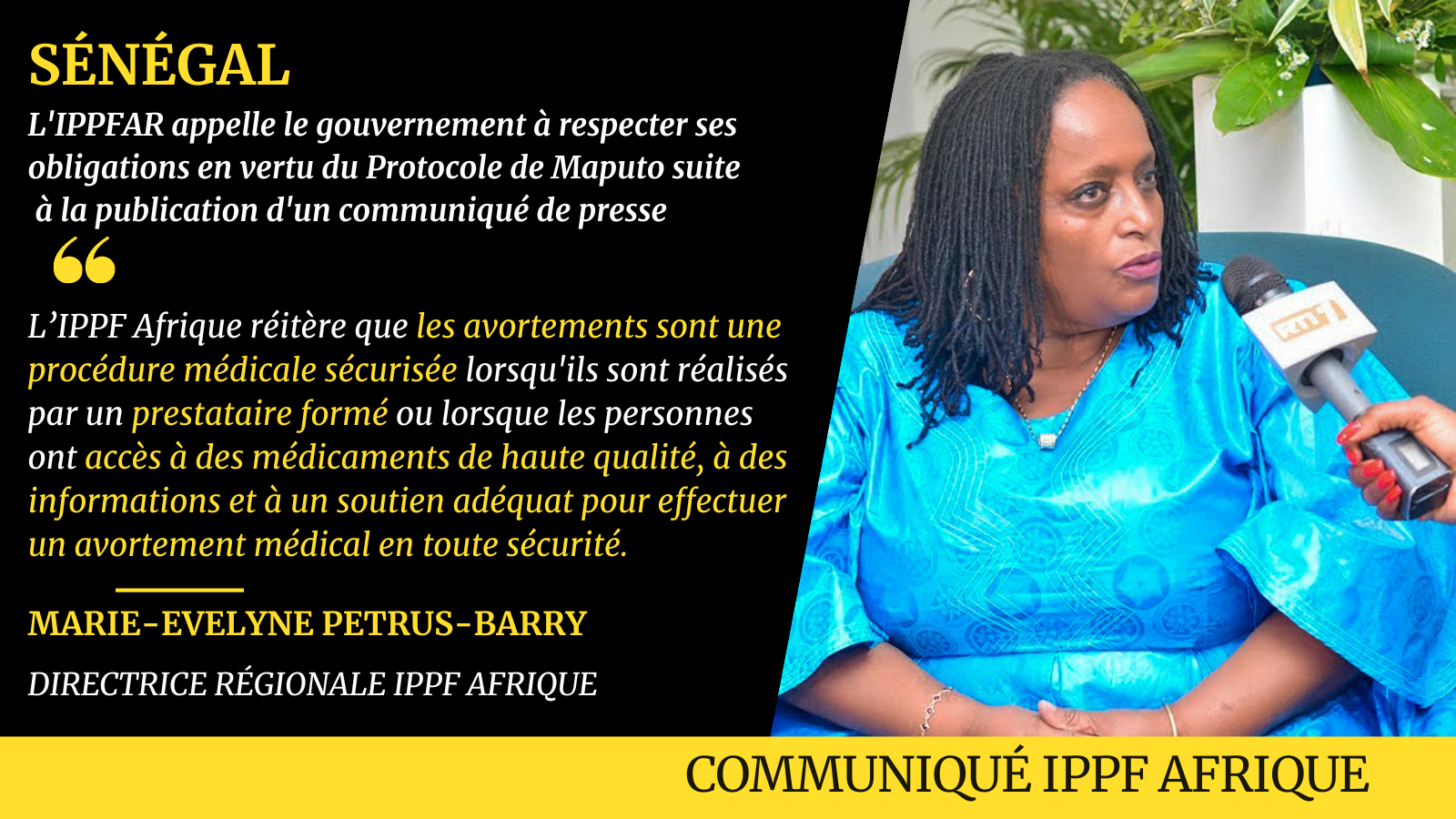
| 04 July 2024
Senegal: IPPFAR Calls on Government to honour Maputo Protocol Obligations in Wake of Press Release
Senegal: IPPFAR Calls on Government to honour Maputo Protocol Obligations in Wake of Press Release 4 July 2024, Nairobi, Kenya: On 8 June 2024, the Ministry of Health and Social Action, Senegal, issued a statement titled ‘On the dangers of induced abortions’ (‘Sur les dangers des avortements provoqués’). While the Senegalese Ministry of Health is correct in warning its citizens of the dangers of unsafe abortions, we are concerned about the interchangeable use of the terminologies “induced abortions”, “clandestine abortions”, and “unsafe abortions” in the statement. Senegal’s penal code completely prohibits the termination of pregnancy, while the medical code of ethics allows an abortion if three doctors agree that it is necessary to save a woman’s life. Such restrictive laws lead to clandestine abortions, while unsafe abortions refer to procedures done by an unskilled provider in a manner that does not adhere to WHO guidelines. “IPPF Africa reiterates that abortions are a safe medical procedure when provided by a trained provider or when a person has access to high quality medication, information and support to safely undergo a medical abortion”, said Marie-Evelyne Petrus-Barry, IPPF Africa Regional Director. The statement makes clear the Government’s concern for the health and wellbeing of women and girls, therefore IPPFAR urges the Ministry of Health and Social Action of Senegal to recognise that without access to safe abortion care, women will continue to suffer and seek life-threatening alternatives. Legally restricting abortion does not reduce rates of abortion, instead, they increase the rates of unsafe abortion and the associated risks including high rates of maternal mortality, which runs counter to the aims of the Senegalese Government as outlined in its press release. Access to safe abortion services is grounded in international legal frameworks and standards, supported by fundamental human rights principles. “We encourage the Senegalese Government to recommit to its obligations under the Maputo Protocol which it ratified in 2005, particularly Article 14(2)(c), which says that States must protect the reproductive rights of women including legally permitting abortion care in cases of sexual assault, rape, incest and where the continued pregnancy endangers the mental and physical health of the mother or the life of the mother or foetus”, added Marie-Evelyne Petrus-Barry. Access to legal and safe abortion reduces preventable maternal mortality. IPPF Africa supports the call by local civil society organisations to break the stereotypes around abortion while also providing accurate health-based information. END For further information or to request an interview, please contact: -Mahmoud GARGA, Lead Strategic Communication, Voice and Media, IPPF Africa Regional Office (IPPFAR) – email: [email protected] / Tel: +254 704 626 920 ABOUT IPPF AFRICA REGION (IPPFAR) The International Planned Parenthood Federation Africa Region (IPPFAR) is one of the leading sexual and reproductive health (SRH) service delivery organization in Africa, and a leading sexual and reproductive health and rights (SRHR) advocacy voice in the region. Headquartered in Nairobi, Kenya, the overarching goal of IPPFAR is to increase access to SRHR services to the most vulnerable youth, men and women in sub-Saharan Africa. Supported by thousands of volunteers, IPPFAR tackles the continent’s growing SRHR challenges through a network of Member Associations (MAs) in 40 countries. We do this by developing our MAs into efficient entities with the capacity to deliver and sustain high quality, youth focused and gender sensitive services. We work with Governments, the African Union, Regional Economic Commissions, the Pan-African Parliament, United Nations bodies among others to expand political and financial commitments to sexual and reproductive health and rights in Africa. Learn more about us on our website. Follow us on Facebook, Twitter, Instagram and YouTube.











